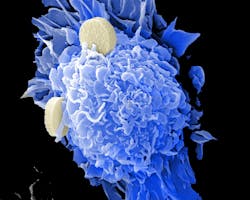Immunotherapy has revolutionized cancer treatment by stimulating the patient’s own immune system to attack cancer cells, yielding remarkably quick and complete remission in some cases. But such drugs work for less than a quarter of patients because tumors are notoriously adept at evading immune assault.
A new study in mice by researchers at Washington University School of Medicine in St. Louis (WUSTL) has shown that the effects of a standard immunotherapy drug can be enhanced by blocking the protein TREM2, resulting in complete elimination of tumors, according to scientists at WUSTL. The findings, which are published in the journal Cell, point to a potential new way to unlock the power of immunotherapy for more cancer patients.
As part of this study, the researchers injected cancerous cells into mice to induce the development of a sarcoma. The mice were divided into four groups. In one group, the mice received an antibody that blocked TREM2; in another group, a checkpoint inhibitor; in the third group, both; and the fourth group, placebo. In the mice that received only placebo, the sarcomas grew steadily. In the mice that received the TREM2 antibody or the checkpoint inhibitor alone, the tumors grew more slowly and plateaued or, in a few cases, disappeared. But all of the mice that received both antibodies rejected the tumors completely. The researchers repeated the experiment using a colorectal cancer cell line with similarly impressive results.
Further experiments revealed that macrophages with TREM2 are found in many kinds of cancers. To assess the relationship between TREM2 expression and clinical outcomes, the researchers turned to The Cancer Genome Atlas, a publicly available database of cancer genetics jointly maintained by the National Cancer Institute and the National Human Genome Research Institute. They found that higher levels of TREM2 correlated with shorter survival in both colorectal cancer and breast cancer.
The researchers are now expanding their study of TREM2 to other kinds of cancers to see whether TREM2 inhibition is a promising strategy for a range of cancers.

